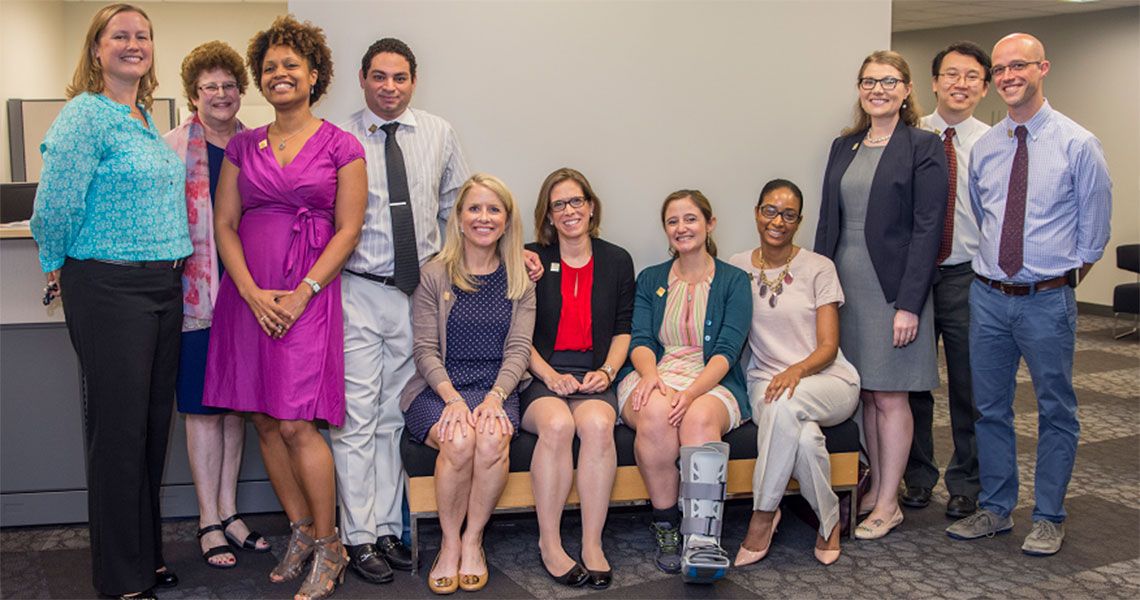Members of Cohort 14, their friends and family members, and deans and colleagues from GW’s School of Medicine and Health Sciences (SMHS) and Children’s National Health System (Children’s National) gathered in the Weingold Conference Center in June to celebrate the completion of perhaps the most significant piece of the school’s faculty development offerings: the Master Teacher Leadership Development Program (MTLDP).
“When I think about the master teacher program, I think certainly about leadership,” said Jeffrey S. Akman, M.D., vice president for health affairs, Walter A. Bloedorn Professor of Administrative Medicine, and dean of SMHS, as he congratulated the graduates and their families. “But I also think about academic innovation, cross-disciplinary research, interprofessional scholarship, and the broader impact MTLDP graduates have on our educational training.
“Our recent revision of the M.D. program curriculum would not have been possible without the involvement of many of the MTLDP graduates, and the M.D. program’s accrediting body, the LCME, cited the program as one of the strengths of the school for its sustained impact on the medical education curriculum.”
The MTLDP is an innovative, year-long leadership development program administered by GW’s Graduate School of Education and Human Development (GSEHD) for SMHS full-time faculty.
Since the MTLDP’s creation in 2002 at Children’s National, more than 150 faculty members practicing at SMHS, Children’s National, or one of GW’s clinical partners such as the Washington DC Veterans Affairs Medical Center have participated in similar graduation celebrations.
“About half of all U.S. medical schools have an organized faculty development program like master teacher, called fellowship programs. Ours is the most rigorous, because it offers university degree-bearing credit,” explained Ellen Goldman, Ed.D. ’05, M.B.A., assistant dean for faculty and curricular development in medical education, and associate professor of human and organizational learning, who completed her 10th year leading the program.
The program’s curriculum focuses on adult learning processes and their implications for teaching; curriculum design as organizational change; the assessment of teaching and learning; introductory qualitative research methods, and principles of teamwork and leadership in organizations. Graduates earn a Certificate in Leadership Development from GSEHD; the credits accrued by participants count towards more than half of a Master’s Degree in Education and Human Development.
This year’s graduates — Candice Dawes, M.D., assistant professor of pediatrics; Catherine Golden, Ed.D. ’14, M.P.A., assistant dean of academic planning and assessment and adjunct assistant professor of clinical research and leadership; Jeremy Kern, M.D., assistant professor of pediatrics; Chavon Onumah, M.D., M.P.H., FACP, AAHIVS, assistant professor of medicine ; Waddaa Redha, M.B.B.S., RESD ’15, research instructor of emergency medicine; Teresa Roberts, M.D. ’03, assistant professor of anesthesiology and critical care medicine and of pediatrics; Ashley Siems, M.D., adjunct instructor of pediatrics; Nora Taylor, M.D., assistant professor of medicine; Jason Tsai, M.D., assistant professor of radiology and of pediatrics; and Sara W. Wikstrom, M.D., assistant professor of medicine —filed one-by-one to the head of the room to discuss their experiences and accomplishments during the graduation celebration.
During the spring 2016 semester, Golden credited her MTLDP training with providing the tools necessary to help develop a pair of online graduate courses over a particularly tight timeline. “Without my master teacher experiences I wouldn’t have been able to accomplish that,” she told the assembly. “I took the elements of the adult learning class, the curriculum development class, and the assessment class to help scope out those courses.”
Kern, who will assume leadership of the fourth-year rotation at Children’s National, has also begun putting his MTLDP training to use. For the past four years he has served as a member of the GW Project Medishare partnership that travels to Themonde, Haiti. “This year [spring break 2017] I’ll be leading a 23-member team of faculty members, M.D. students, nursing students, pretty much every kind of student, on a mission to provide clinical care for patients living in Haiti’s central plateau,” he said. “The MTLDP has helped me to develop a concrete curriculum for the students joining us on this trip, engaging them using adult learning and other health educational strategies to helping students learn more about the social determinants of health and what goes into providing the medial care that is needed in the region.”
For her part, Onumah, who will serve as director of GW’s Primary Care Clerkship in the 2016-17 academic year, used her MTLDP experience to narrow her attention to a couple of vital subjects.
“I am most proud of my ability, through the MTLDP, to focus on two areas I am very passionate about: improving health disparities and medical education,” she said.
Onumah also helped to develop the HIV and Internal Medicine Pathway, a program geared toward providing internal medicine residents with more specialized training in HIV medicine, through her year in the program.



